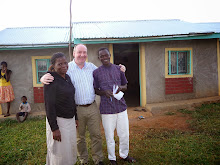The gentle low pitched grunts of hippo's, joyfully resonate through the rain and the mosquitos have temporarily run for cover (though I am convinced that every bug and insect in Nyanza province is poised, ready to spring into action - full biting mode - at the first sign of new life).
 |
| Jacaranda flowers by Lake Victoria |
It has rained every time I have visited Kenya. Yes, every time for the last
16 years.
I arrived in Nairobi yesterday to wet pavements and standing water on the roads. I asked Douglas, my taxi driver, when the rains had arrived. “This is the first we
have had since last year” he said.
“Typical”, I thought, “I have brought the weather from
Lancashire!”
You see, I know a thing or two about rainy places. I lived for a
number of years in Preston, officially the third wettest city in Britain after
Cardiff and Glasgow.
 I now live near Burnley, which attracts an enormous 1154mm
of rainfall every year – no wonder our reservoirs are always full “oop North”.
I now live near Burnley, which attracts an enormous 1154mm
of rainfall every year – no wonder our reservoirs are always full “oop North”.
“In some parts of Kenya, you know,
it hasn’t rained for more than three years”, Douglas continued
And then I felt bad.
 |
| Parched Lands in the Rift Valley |
As I took the short flight from Nairobi to Kisumu, above the
volcanic craters, steep hills and great lakes of the Rift Valley, I could see
for myself how dry things were. Fields and plantations, usually great swathes
of fertile green valleys awash with maize and tea plantations, were brown and parched.
I had read about the drought, of course. The Disasters
Emergency Committee have launched a huge appeal for funds and people throughout
Kenya, Somalia, Ethiopia and South Sudan face the very real prospect of
starvation.
In Northern Kenya people are dying, fighting over grazing land for
cattle and livestock, over access to water and the army are being deployed to
sensitive areas to keep the peace.
Last month the Kenyan government declared
the drought a national disaster and the Kenya red cross estimates 2.7m people
face starvation.
As if the lack of food weren’t enough cholera outbreaks are on
the increase as the lack of clean drinking water takes it’s toll.
I suddenly felt very fortunate to live where I do, to know
the cool of winter, the rains of spring and autumn and the graciousness of a
summer to grow enough food for our needs.
 |
| Moses (not the one who can part waters!) |
I met Moses at the airport in Kisumu and we drove the short
distance to Sunset Hotel, my regular resting place in Kisumu on the shores of
the Lake. We talked all afternoon, catching up on news, ideas and plans and on
the work of the Trust.
We talked about food security and the availability of fresh, clean water. Moses shared that the
well that we dug at Kibos is now one of the few wells in the village that
hasn’t dried up, with queues snaking around our acre or so of land as people
line up to fill their jerrycans.
We organised our week together over a cup of
hot Kenyan tea while little vervet monkeys scurried around the grounds, jumping
on the tin roofs and the hotel tables, scurrying into the safety of the trees
when the staff tried to chase them away.
“Has it rained here yet?” I asked Moses, an hour before the storm hit.
“Not yet”, he replied, “but you are here
now, so it will come!”

Tim, it's great to see you blogging once more! By coincidence I am putting together next month's Gargrave Parish Magazine this evening. I am inclined to include some of your blog posts in it to help pave the way for the fundraiser in May - hope that's OK with you. Bless you! Duncan.
ReplyDeleteHi Tim, great to read your very descriptive blog, you conjure up a vivid atmospheric picture. The numbers of people who are starving and as I write the words I am in disbelief about the word "starving" because even with my colourful imagination- I cannot
ReplyDeleteCreate the experience of starvation- oh there for the grace of God go I. And 2.7 million? Can't get to grips with it- but the human tragedy- that is overwhelmingly sad and frightening . Keep blogging and God Bless all xxxxx